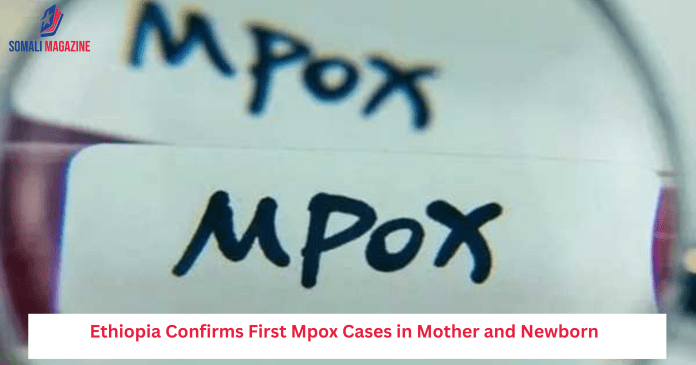Facebook Twitter (X) Instagram Somali Magazine - People's Magazine
Health officials report cross-border transmission in Moyale town; contact tracing and quarantine measures underway to prevent further spread
Ethiopia has confirmed its first cases of mpox (formerly known as monkeypox), involving a 21-day-old baby and the baby’s mother. The cases were reported in Moyale, a town in southern Ethiopia near the border with Kenya.
The Ethiopian Ministry of Health and the Ethiopian Public Health Institute made the announcement on Sunday. According to health officials, the father of the infant had recently traveled across the border, which may have been how the virus was brought into the country. The family lives in Moyale, a busy town known for trade and travel, which increases the risk of cross-border disease transmission.
Mpox is a viral disease that spreads through close contact with an infected person or animal, or with materials like bedding or clothing that have touched the virus. It can cause fever, rashes, and swollen lymph nodes. In some cases, it can lead to serious health problems, especially for people with weakened immune systems or small children.
So far, several relatives who had contact with the infected mother and baby have been placed under quarantine to stop the virus from spreading. Health teams have also been sent to the area to trace any other people who may have had contact with the family. These teams are working to contain the virus, especially in towns and villages close to the border.
In a joint statement, the Ministry of Health and the Ethiopian Public Health Institute said that investigations are still ongoing to confirm how the virus was introduced. However, early signs point to cross-border transmission, most likely from neighboring countries like Kenya or Somalia, where mpox cases have been reported in recent years.
Although these are the first confirmed cases in Ethiopia, the country has been preparing for the possibility of an outbreak since 2022. That year, the World Health Organization (WHO) declared mpox a global public health emergency after the virus began spreading to several countries outside its usual regions in Central and West Africa.
Since then, Ethiopia has increased its monitoring efforts, particularly in high-risk areas like border towns. Public health officials have been training medical staff, raising public awareness, and improving detection systems to respond quickly to any suspected cases.
Now that mpox has officially been detected in Ethiopia, health authorities are urging the public to take precautions. They advise people to avoid close contact with anyone showing symptoms like rashes or fever and to report any suspected cases to health centers immediately.
The Ministry of Health also encourages people, especially those living in border regions, to stay informed about the symptoms and how the disease spreads. While there is currently no specific treatment for mpox, most people recover fully with proper care. In some cases, antiviral medications may be used, and vaccines are available in some countries for high-risk individuals.
Ethiopia’s response includes isolating confirmed cases, tracing contacts, and strengthening public health messaging. Authorities are working to stop further spread and to keep communities informed and protected.
As of now, no other confirmed cases have been reported in Ethiopia, but health experts are watching the situation closely. They continue to investigate the source of the infection and monitor those who were in close contact with the family.
This development highlights the importance of strong cross-border cooperation in preventing and managing disease outbreaks. Health officials stress that awareness, early detection, and community cooperation are key to stopping the spread of mpox and keeping the population safe.

